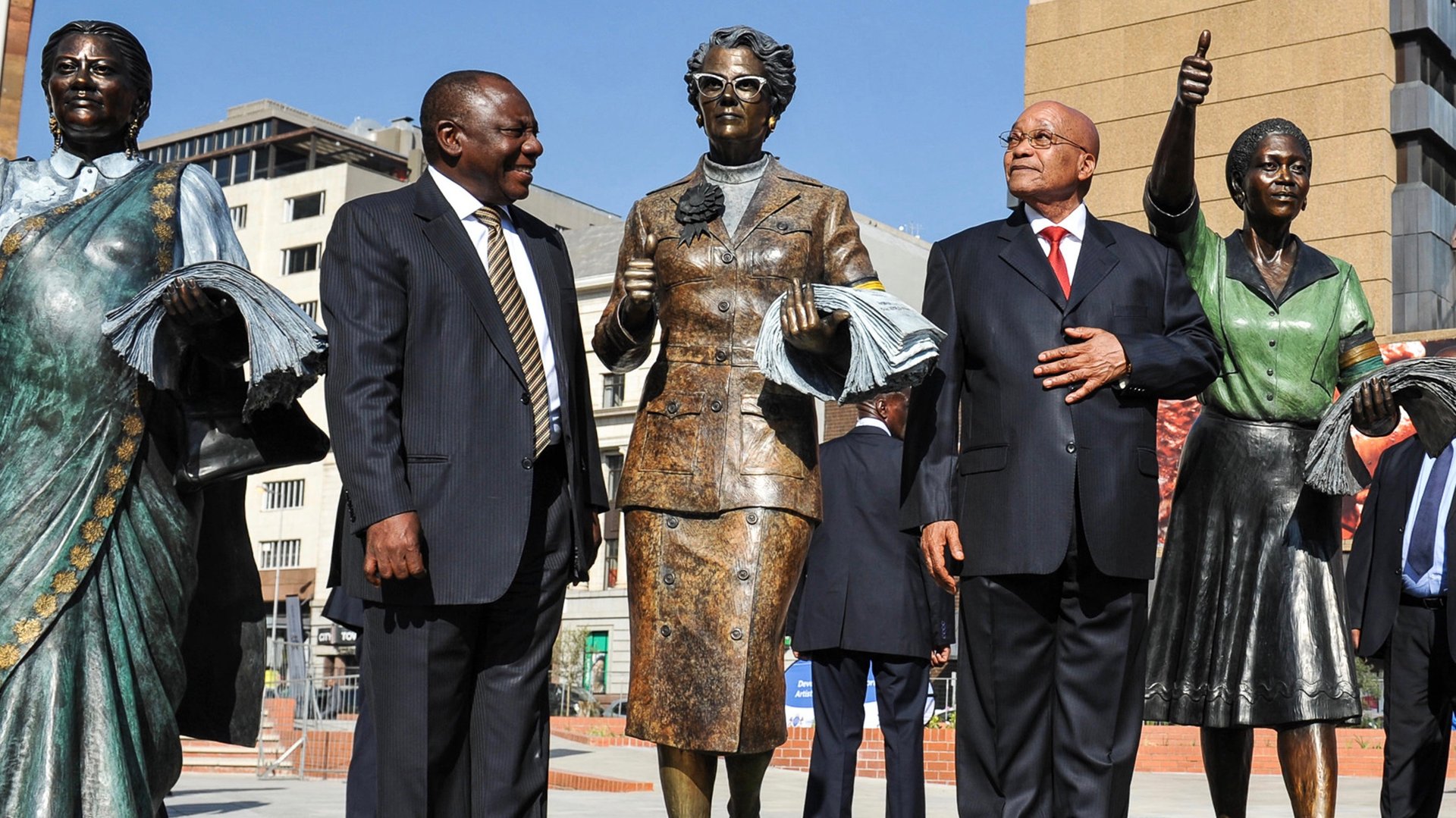In South Africa, political sex scandals don’t hurt powerful men, just the women entangled in them
The political rumor mill would have South Africans believe that the next man to lead the country is a sugar daddy, or locally known as a “blesser.”


The political rumor mill would have South Africans believe that the next man to lead the country is a sugar daddy, or locally known as a “blesser.”
“Deputy president Cyril Ramaphosa, whose presidential campaign is modeled on moral and ethical leadership, appears not to practice what he preaches,” read the Sunday Independent newspaper’s Sept. 3 lead in what is the latest sex scandal starring a South African politician.
Rampahosa, long seen as South Africa’s president-in-waiting, is just the latest in a long string of politically powerful men embroiled in a scandal where women are the victims, ranging from extra-marital affairs to the more grave accusations of sexual harassment and battery. South Africa is an outwardly conservative society in which the family unit is the foundation. There is also a strong undercurrent of patriarchy that ensures that the scandalous behavior of powerful men does not affect their standing in society.
Moralizing over the salacious details of Ramaphosa’s alleged extra-marital affairs may have caused a stir for a moment in the news cycle, but his bid for the presidency remains strong. Instead, as in previous cases, it is the women dragged into these scandals who are most affected.
The most infamous example remains the young women who accused president Jacob Zuma of rape in 2007. She was attacked by the party’s women’s league and eventually hounded out of the country after he was acquitted. The woman, dubbed Khwezi in an attempt to protect her identity, died last year at the age of 41, but her experience has set the tone for how women used in political scandals will be treated.
Ramaphosa is likely the victim of a political smear campaign that cynically taps into the public shame of South African society—the high rates of violence against and exploitation of women, says essayist Sisonke Msimang. “Gender issues are always collateral damage,” says Msimang. “Time and again what we see is women used in these wars between men.”
What happens in the bedrooms of politicians shouldn’t be anyone’s business, but it matters when voters assess the kind of country they want, and the kind of person they want to lead it. That conversation need not be salacious, she adds, but instead it is overshadowed by a narrative that pits one faction’s corruption scandals versus the other’s sex scandals. It shows, as the leader of the ANC’s Women’s League who defended a deputy minister who assaulted a woman once said, everyone has “little skeletons.”
These particular skeletons began rattling in Ramaphosa’s closet just weeks before the African National Congress’ elective congress, where he hopes to be elected leader of the party, and almost by default, South Africa’s next president. After a Saturday evening court bid to gag the newspaper failed, he offered an exclusive to a rival Sunday paper in which he admitted to one extra-marital affair eight years ago. The front-page scandal, the deputy president maintained, was part of a plot that used state security resources to create a dossier of transgressions to derail his political ascent. In his first appearance since the scandal, Ramaphosa told his colleagues in parliament on Sep. 6 that he would be accountable and make a full statement in a few days.
“The women are inconsequential, the real target is that man, but the sexuality of those women, their own lives, everything about them is cheapened in the hunt for that big prize, which is the man,” says Msimang.
In Ramaphosa’s case, the newspaper justified publishing the story from a moralistic position. Ramaphosa is the head of the South African National Aids Council and has spoken out against “blessers,” a local colloquialism for wealthy men who sponsor the lavish lifestyles of usually, much younger women. Ramaphosa himself has blamed sugar daddies for spreading HIV in a country that has one of the world’s largest populations living with HIV/Aids. The newspaper described some of the eight women Ramaphosa “preyed” on with his “massive wealth” as “emotionally battered” and in need of cash.
In other incidents, there is rarely a justification provided beyond the tabloidization of real political issues. In May, when minister in the presidency Jeff Radebe was caught demanding nude pictures from a staff member at the Union Buildings, all he had to do was to apologize and weather a social media storm. The woman was vilified. Radebe and Ramaphosa find themselves in the company of the finance minister, the minister of police and the president—all of whom still have their jobs.
“I think it points to possibly some real questions about why, at the level of political leadership, we struggle with leadership in relation to violence against women,” said Lisa Vetten, a researcher on gender-based violence, speaking on Redebe’s scandal.
Those questions will likely go unanswered because the gender issues disappear in a political fog. The women identified in these scandals are slandered or identified as a “third force” trying to usurp the ANC, said socio-political analyst Oliver Dickson.
What it does, says Msimang, is lower the discourse about gender issues in South Africa for the sake of party politics. Prominent South Africans are then forced to come out in defense of the perpetrator and in doing so, blame the victim.
“What matters is that we get Jacob Zuma out,” says Msimang, imagining the choices these defenders have to make. “On the back of who? Young women.”